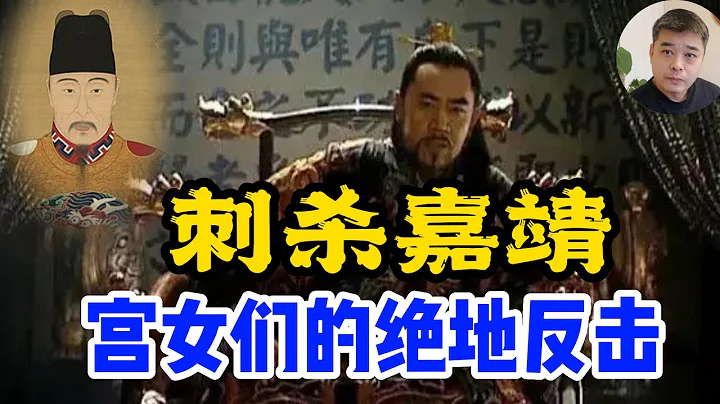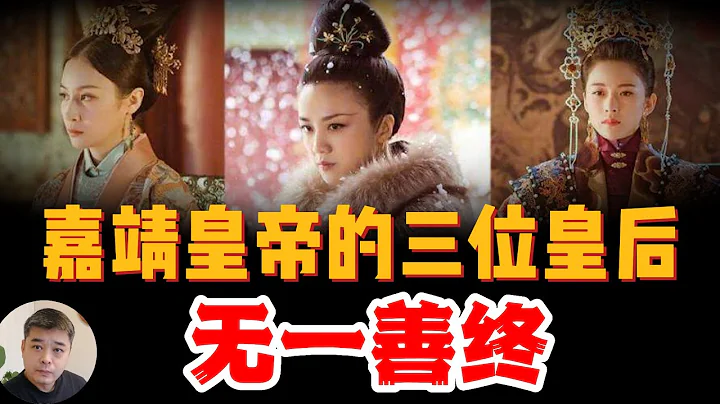From the moment he became the emperor, Emperor Jiajing began to use his genius understanding of power to play with countless people.
In 1521 AD, Emperor Wu Zong of Ming Dynasty Zhengde Zhu Houzhao died suddenly and left no prince to succeed the throne. After much deliberation, the Queen Mother and the ministers decided that the nearest imperial family and the cousin of Ming Wuzong—Zhu Houxuan, the son of King Xingxian, would inherit the throne. Zhu Houhui's father (Xingxian Wang Zhu Youzhan) was feudalized in Luzhou, Huguangan (now Zhongxiang, Hubei), and his father (Ming Xiaozong Zhu Youzha) was his brother.

When it is, Zhu Houyun is 15 years old. On the 6th day after the Beijing delegation arrived in Anlu, Zhu Houhuang set foot on the journey north. Unlike the Beijing mission who rushed to Anlu in only 12 days, it took Zhu Houhuang nearly 20 days to complete the same journey. Although the country has no owner for more than a month and the whole country is eagerly looking forward to the arrival of the new monarch, Zhu Houxuan, who is 15 years old, seems quite calm. He knows that he should not show any eagerness at this time.
After Zhu Houhuang arrived in Beijing, he temporarily stationed outside the city, waiting for the court to come out with the etiquette details about his succession. When the relevant arrangements were submitted, Zhu Houxuan was unhappy: the plan negotiated by the chief assistant Yang Tinghe in conjunction with the Ministry of Rites was that Zhu Houxuan would succeed as the "prince" as the king. This means that before ascending to the throne, Zhu Houhou must first complete the ceremony to become a crown prince, and then choose a day to be crowned emperor.
The 15-year-old teenager immediately refused with a political sensitivity that was not commensurate with his age. He said: The will is very clear, I will directly ascend to the throne, without mentioning the need to become a crown prince first. Zhu Houxuan categorically returned the succession plan to the Ministry of Rites and ordered it to be redrawn. In this regard, Yang Tinghe, the first assistant of the court, unexpectedly led the officials to urge Zhu Houhui to accept and perform the procedures proposed by the Ministry of Rites. Zhu Houxuan categorically refused again, and the two sides remained deadlocked.
The country has no ruler for more than one month, and the new ruler has already welcomed Beijing. But he was not ascended. This situation can't be dragged off, it will drag on, people's hearts will float, chaos will arise, and I don't know what will happen. Zhu Houhui was right about this. Invisibly, he uses the country as the hostage to force the opponent to meet his own conditions.
In the end, the two parties reached a compromise: Xinjun went directly to the palace; while sending officials to sue the Taimiao and Sheji altar as representatives, Xinjun himself went to see Wu Zongling in front of him, and then bowed to Empress Dowager Zhang; finished these two things , It went straight to Fengtian Hall (now Taihe Hall, folk folk called "Golden Luang Hall"). This ceremony essentially dispenses with the link of obtaining the crown prince status, and directly proclaims the court.
Soon after holding the Jiajing Emperor's dynasty, he launched a political campaign of "grand rites and discussion", involving all officials from the court.

At that time, Emperor Jiajing ordered the officials to agree on the posthumous title of Ming Wuzong and the main priest and title of his biological father. The minister of the imperial court headed by the cabinet chief Yang Tinghe cited historical precedents and believed that since Jiajing was transferred from Xiaozong to the successor, it should respect the orthodoxy and take Ming Xiaozong Zhu Youzhan (note: Emperor Jiajing’s uncle) as the emperor. The king of Xingxian Zhu Youzhu (note: the father of Emperor Jiajing) was renamed "The King of Emperor Xingxian". His mother and concubine Jiang was the "Grand Concubine of Xingguo" and his biological parents called themselves "Emperor Nephew" during the sacrifice.
For Emperor Jiajing, this is absolutely unacceptable, and the two sides are deadlocked. In 1524 AD, more than 200 officials protested to the Emperor Jiajing, forcing him not to recognize his father. Jiajing lost his temper. These officials were fined with court staff. As a result, 16 people were killed on the spot and 134 were imprisoned.
At that time, Xinke Jinshi Zhang Jingshang supported Sejong, thinking that Zhu Houhuang's ascension to the throne was to inherit the imperial line, not to inherit the imperial heir, the so-called "inherit the heir without heir", and the imperial line does not necessarily have to be succeeded by father and son. Zhang Cong suggested that Zhu Houhuang still take his biological father as a test and set up a temple for offering the king in Beijing. Zhu Houhui was overjoyed after seeing this memorial.
One of the five-year "big ceremony" between Emperor Jiajing and the civil official group headed by Yang TingheThe struggle ended with the high pressure of the monarchy. Yang Tinghe, the cabinet chief who opposed the "grand ceremony", was eventually dismissed. After the "great ceremony and discussion" dispute, Zhu Houhu was already full of wings. He realized how to exercise the supreme majesty of imperial power, and since then became arbitrary.
After the stabilization of his political power, Emperor Jiajing gradually became corrupt, building civil engineering, superstitious alchemists, and the art of immortality. In the past history, as well as in the Ming Dynasty itself, there was no shortage of emperors who "ignored the political affairs" because of ridicule or indulging in private interests. Zhu Houhu's behavior was very similar to them at first glance. In the late reign, he buried his head in seeking truth and hiding. In Xine (now the Chongnanhai area), they basically did not show up, and many courtiers had not even seen the "Tianyan" once in 20 years.

If you think that Zhu Houhuang is an emperor who "ignores the government", it is a big mistake. According to the "Records of Shizong", Emperor Jiajing "pays attention to Yuxuandao in his later years and builds the palace in the west", but "although he lives in the abyss, his authority does not move.
What is the prestige handle? In today's words, it is the seal that held Emperor Jiajing Zi Jiajing firmly and never let go. Although he lives in simplicity, he remains highly vigilant about everything. He has never been at ease about what happened outside, and nothing can escape his ears; not only that, although he does not appear in public, he never gives up reviewing documents and making major decisions. They were all made by him himself, and he often summoned a few important ministers to listen to their work reports.
Here is a proof. At that time, someone at the home of Xu Jie (note: the first minister of the cabinet during the Jiajing period) had seen Jiajing's manuscript and the memorials he had reviewed. Jiajing not only personally reviewed all the will of Xu Jiedai, but also made changes one by one, which shows that he is extremely serious. However, this is not only serious, but more importantly, as a sign of power ownership, as a silent warning and reminder to ministers: I am the emperor, and the authority is mine. This is called "the prestige does not move."
Speaking of the Ming Dynasty Taizu Zhu Yuanzhang and Ming Chengzu Zhu Di, both held a firm grasp of authority, but that was the result of nights and sorrows, waking up and greedy dark, and the Jiajing emperor was hiding behind the scenes and staying at home. Everything is under control. The depth of its tactics can be seen from this.
Jiajing, as a savvy power schemist, has penetrated into an essential question: Whether the power is stable or not has nothing to do with diligence and love for the people. The key lies in control: strong control, even if you hide in Jiuxiao Palace. Manipulate everything; control is weak, even if you forget to sleep, sleep and spend day and night at work, it will not help or not. What is control? In short, it is how to use people to control people.

Practice over the years has proved that Jiajing is a thick black genius with strong control. He first transferred Zhang Cong and others to Beijing to defeat Yang Tinghe, the first assistant, but he was not eager to reuse them. He still let Jiang Mian, whom he hates, take charge of the cabinet. After that, I would rather recruit Yang Yiqing, a retired veteran of the court, to replace the first assistant, and Zhang Cong and others who have made great contributions in the "grand ceremony". This is the desire to promote and suppress, deliberately chilling Zhang Cong's heart, so as to teach them not to be complacent.
It was not until October in the sixth year of Jiajing (1527 AD) that Zhang Cong entered the pavilion for the first time, and after more than a year, Gui E was appointed to the pavilion. However, after only six months, Jiajing found a cause, and suddenly ordered Zhang Cong to return to his hometown to make provincial reforms, and ordered Gui E to be an official (returning the official position). Not long after Zhang Cong left Beijing, in September, he immediately received an order to call him back into the pavilion; in November, Gui E was also called to join the pavilion again. Since then, the single Zhang Zhang has been repeatedly tossed twice in this way. Finally, in April 14th in Jiajing, he was finally allowed to retire completely, no more tossing. Before and after
, Zhang Cong had "three ups and downs" from Jiajing six to fourteen years. It can be seen how powerful Jiajing controls people. He was obviously deliberate, using cat and mouse tricks to capture and regain, and then regain, "so the court officials are all fearful."
After Zhang Cong, Xia Yan became the number one celebrity and he was highly credited. However, Jiajing replayed the tricks of cats and mice, making him "two ups and two downs", and finally in the 27th year of Jiajing ( 1548 ADYears) first dismissed from office, then arrested and decapitated. Yan Song, who rose up because of the overthrow of Xia Yan, was a treacherous and cunning man who had been careful to flatter Jiajing for more than ten years. Ju He was dismissed, ransacked, and his son was executed. He died of loneliness and poverty.





















